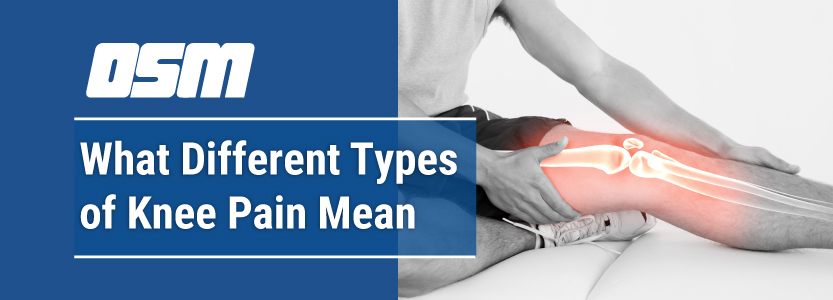What Different Types of Knee Pain Mean
Article featured on Healthgrades
If you’ve ever experienced pain in one or both of your knees, you’re not alone. About one-third of all Americans have felt pain in this major joint at some point in their lives. Women are slightly more likely than men to be affected by it (about 20% of women versus 15 to 20% of men).
Yet the millions of people with this pain don’t all feel the same thing. Knee pain can be sharp or dull, burning or excruciating, accompanied by strange noises or silent. What does your knee pain tell you about what’s wrong?
1. Knee pain with a ‘crunch’
Sometimes knees creak, crack or crunch when you bend them. These sounds—called ‘crepitus’—may be alarming, but don’t necessarily signify a problem, unless your knee hurts at the same time.
If that happens, you could have an injury, such as a torn meniscus (a type of cartilage in your knee) or a dislocated kneecap. The sounds together with pain also could indicate osteoarthritis. Your doctor should check for the source of both your painful sensations and strange sounds.
2. Knee pain when running
If you have a dull pain in and around your kneecap when you run or are doing other activities, you may have ‘runner’s knee,’ also called patellofemoral pain syndrome. Other symptoms include kneecap tenderness, pain when you sit for a long time with your knees bent, and rubbing, grinding or clicking sounds when you bend or straighten your knee.
This syndrome can be caused by running and overuse, as well as structural defects in the knee, shoes that aren’t supportive enough, walking or running with your feet positioned improperly (such as turning in), and injury.
3. Knee pain in the morning
If you wake up with a painful and stiff knee, but find that the aching eases over the course of the day, you may have rheumatoid arthritis. This is an inflammatory disorder in which the body’s immune system attacks joints, such as the knee. Other autoimmune disorders, such as lupus, also can cause similar symptoms.
If you have rheumatoid arthritis symptoms, contact your doctor, especially if you are experiencing pain and stiffness in other joints. Left untreated, rheumatoid arthritis can lead to joint disfigurement.
4. Knee pain when climbing stairs
One of the first signs of osteoarthritis is pain in the knee when going up or down stairs. This pain tends to get worse throughout the day. While osteoarthritis knee pain is usually achy, it can also sometimes be sharp or burning. Other symptoms include swelling, stiffness and feeling like your knee is grinding or may give way.
Osteoarthritis is a degenerative condition in which protective cartilage at the end of your leg bones wears down. This can ultimately result in bones rubbing against each other, causing pain, swelling, and loss of motion.
5. Knee pain with a pop
One common type of knee injury is a tear to the anterior cruciate ligament, or ACL, which connects your thigh bone to your shin and helps keep your knee stable. When the injury happens, you’ll likely hear a loud pop or else feel a popping inside, along with severe pain.
A damaged ACL is likely to leave you with rapid, significant swelling; difficulty fully straightening your leg or bending your knee; and pain when you try to put weight on it. You may feel like the knee is going to give way. In some cases, surgery to repair the ligament may be necessary.
6. Knee pain that’s sudden and severe
If you experience a sudden onset of severe knee pain along with redness, warmth and swelling, especially in the early morning, you might have gout, an arthritic condition that is most commonly seen in the big toe. However, gout also can strike other joints, especially in the leg. Gout can recur and should be treated to help prevent permanent joint damage.
Another reason for sudden severe pain and swelling in a knee is Lyme disease. Children are especially likely to have this symptom of Lyme disease, an infection caused by bacteria from an infected tick. If you suspect Lyme disease, promptly seek care to reduce the risk for complications associated with the disease.
7. Knee pain with bending and kneeling
People in professions that require repetitive kneeling, such as roofers, floor installers, plumbers, coal miners, gardeners and maids, are most at risk for bursitis of the knee. Bursitis refers to inflammation of the bursal sacs of fluid that are around joints.
Repeated bending and kneeling, especially on hard surfaces, can irritate the bursa in the knees, causing gradually worsening symptoms. These symptoms include pain, redness, warmth, swelling, joint stiffness, and sometimes fever, which is a sign of infection. Notify your doctor for a full evaluation and to rule out infection. Bursitis also can be caused by an injury, but this is less common.
The Orthopedic & Sports Medicine Center of Oregon is an award-winning, board-certified orthopedic group located in downtown Portland Oregon. We utilize both surgical and nonsurgical means to treat musculoskeletal trauma, spine diseases, foot and ankle conditions, sports injuries, degenerative diseases, infections, tumors and congenital disorders.
Our mission is to return our patients back to pain-free mobility and full strength as quickly and painlessly as possible using both surgical and non-surgical orthopedic procedures.
Our expert physicians provide leading-edge, comprehensive care in the diagnosis and treatment of orthopedic conditions, including total joint replacement and sports medicine. We apply the latest state-of-the-art techniques in order to return our patients to their active lifestyle.
If you’re looking for compassionate, expert orthopedic and podiatric surgeons in Portland Oregon, contact OSM today.
Phone:
Address
17355 Lower Boones Ferry Rd Suite 100A
Lake Oswego, OR 97035
Hours
Monday–Friday
8:00am – 4:30pm



